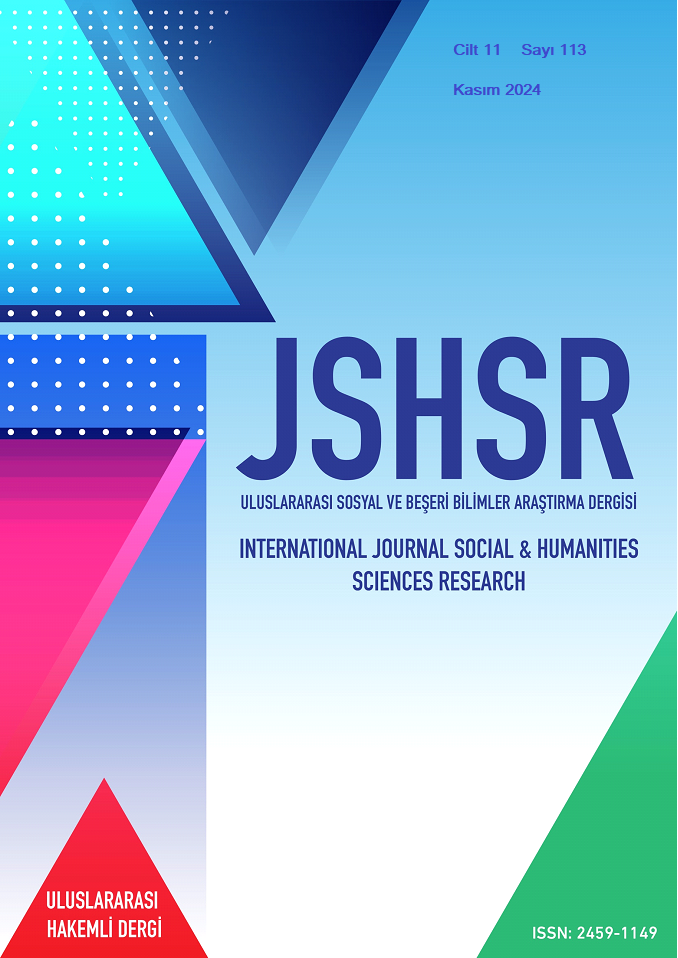The Effect of Cooperative Learning in Performing Polyphonic Choral Work
DOI:
https://doi.org/10.5281/zenodo.14279363Keywords:
Music education, choral education, singing skills, active learning, cooperative learning.Abstract
The aim of this study is to investigate the effectiveness of polyphonic piece practices using the "let's learn together" technique, one of the cooperative learning methods. The research design is one of the quasi-experimental models; pre-test-post-test paired control group experimental design. The research was conducted with 28 students from 10th grade music students who received polyphonic choir education at Trabzon Akçaabat Fine Arts High School. Experimental and control group performances were recorded with a voice recorder. The data collection tools of the study were the polyphonic choir education performance evaluation rubric developed by the researcher by taking expert opinion. A statistical package programme was used to analyse the data. In the study, the reliability of inter-rater agreement was tested by calculating Krippendorff's Alpha coefficient and the post-test scores of the experimental and control groups were compared by Mann Whitney U test. According to the results of the study, no statistically significant difference was found between the experimental and control groups in the polyphonic piece practices using the "let's learn together" technique, one of the cooperative learning methods. This result was compared with different results in the literature in the discussion section and possible reasons were stated and suggestions for future studies were presented.
References
Abrami, P. C. (1995). Classroom connections: Understanding and using cooperative learning. Houghton Mifflin Harcourt P.
Bilen, S., & Açıkgöz, K. Ü. (2019). İşbirlikli öğrenmenin şarkı söyleme becerileri üzerindeki etkisi. Van Yüzüncü Yıl Üniversitesi Eğitim Fakültesi Dergisi, 16(1), 803-817.
Bıkmaz-Bilgen, Ö., & Doğan, N. (2017). Puanlayıcılar arası güvenirlik belirleme tekniklerinin karşılaştırılması. Journal of Measurement and Evaluation in Education and Psychology, 8(1), 63-78. https://doi.org/10.21031/epod.294847
Clarke, D., & Clarke, E. (2014). Music and consciousness: A continuing project. Arts and Humanities in Higher Education, 13(1-2), 77-87.
Çelik, S., Şenocak, E., Bayrakçeken, S., Taşkesenligil, Y., & Doymuş, K. (2005). Aktif öğrenme stratejileri üzerine bir derleme çalışması. Atatürk Üniversitesi Kazım Karabekir Eğitim Fakültesi Dergisi, 11, 155-185.
Çevik, S. (1999). Koro eğitimi yönetimi ve teknikleri. Yurtrenkleri Yayınevi.
Egüz, S. (1991). Toplu ses eğitimi I:(temel konular). Ayyıldız Matbaası.
Ekinci, N. (2007). İşbirliğine dayalı öğrenme. Ö. Demirel (Ed.), Eğitimde yeni yönelimler içinde, (s.93-108). Pegem Yayıncılık.
Eymen, U. E. (2007). SPSS 15.0 veri analiz yöntemleri. İstatistik Merkezi Yayınları No:1.http://yunus.hacettepe.edu.tr/~tonta/courses/spring2009/bby606/SPSS_15.0_ile_Veri_Analizi.pdf
Hayes, A. F., & Krippendorff, K. (2007). Answering the call for a standard reliability measure for coding data. Communication Methods and Measures 1(1), 77-89.
Johnson, D. W., & Johnson, R. T. (2008). Cooperative learning: successful integration of theory, research, and practice. The Annual Report of Educational Psychology in Japan, 47, 4-8. https://doi.org/10.5926/arepj1962.47.0_4
Kılbaş, M., Halvaşi, B., & Bağcı, H. (2022). Müzik eğitiminde işbirlikli öğrenme yönteminin kullanımının incelenmesi. Turkish Studies-Educational Sciences, 17(2), 353-367.
Kocabaş, A. (1995). İşbirlikli öğrenmenin blok flüt öğretimi ve öğrenme stratejileri üzerindeki etkisi. [Yayımlanmamış Doktora Tezi]. Dokuz Eylül Üniversitesi, Sosyal Bilimler Enstitüsü, İzmir.
Kocabaş, A. ve Uysal, G. (2006, Nisan 26-28). İlköğretimde işbirlikli öğrenmenin müzik öğretiminde sınıf atmosferi ve şarkı söyleme becerileri üzerindeki etkisi. [Sempozyum Bildirisi]. Ulusal Müzik Eğitimi Sempozyumu. Pamukkale Üniversitesi Eğitim Fakültesi, Denizli.
M.E.B. (2016), Çok Sesli Koro Eğitimi Dersi Öğretim Programı (10 ve 11. Sınıf), T.C. Millî Eğitim Bakanlığı, Ortaöğretim Genel Müdürlüğü.
Karasar, N. (2003). Bilimsel araştırma yöntemi (12. Baskı.). Nobel Yayın Dağıtım.
Prest, A., & Goble, J. S. (2021). Language, music, and revitalizing Indigeneity: Effecting cultural restoration and ecological balance via music education. Philosophy of Music Education Review, 29(1), 24-46.
Ravignani, A., Thompson, B., Grossi, T., Delgado, T., & Kirby, S. (2018). Evolving building blocks of rhythm: how human cognition creates music via cultural transmission. Annals of the New York Academy of Sciences, 1423(1), 176-187. https://doi.org/10.1111/nyas.13610
Say, A. (2010). Müzik Ansiklopedisi Besteciler, yorumcular, eserler, kavramlar. Müzik Ansiklopedisi Yayınları.
Slavin, R. E. (1995). Cooperative learning: Theory, research, and practice. Allyn & Bacon.
Şirin, C., & Deniz, J. (2022). Batı müziği teori ve uygulaması dersinde işbirlikli öğrenme yönteminin etkililiği. Trakya Eğitim Dergisi, 12(3), 1329-1355.
Ün Açıkgöz, K. (2002). Aktif öğrenme. Eğitim Dünyası Yayınları.
Downloads
Published
How to Cite
Issue
Section
License
Copyright (c) 2024 INTERNATIONAL JOURNAL OF SOCIAL HUMANITIES SCIENCES RESEARCH

This work is licensed under a Creative Commons Attribution 4.0 International License.


